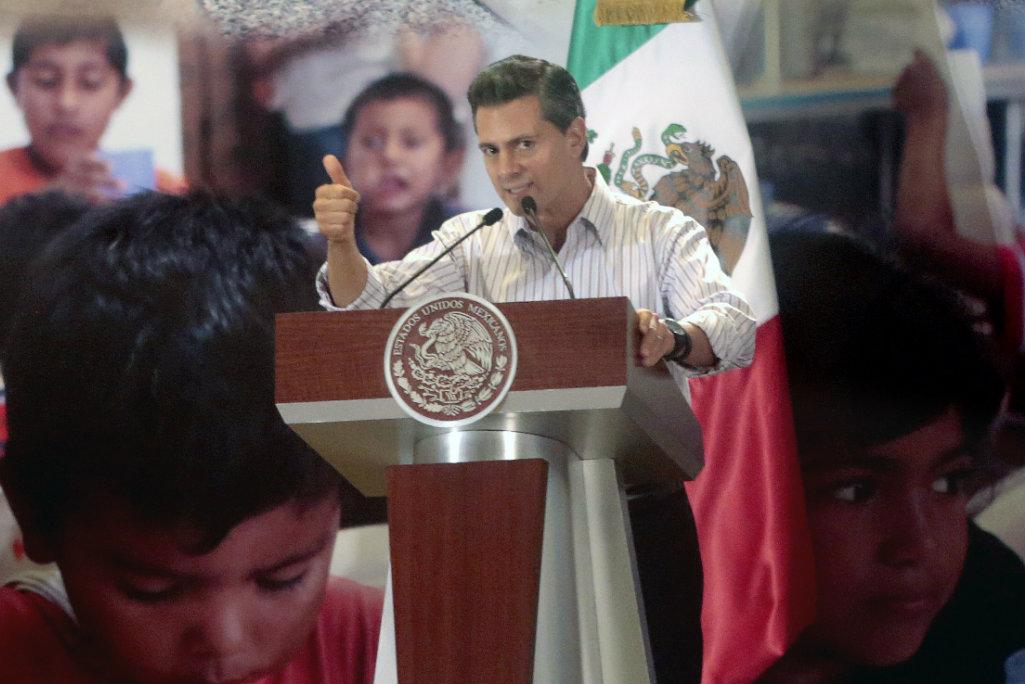Mexican drug murders get less attention in US than Middle East violence
Mexican President Enrique Pena Nieto delivers a speech during the presentation of the programme ‘Nuevo Guerrero’ (New Guerrero) in Acapulco, Guerrero State, Mexico, on Dec. 4, 2014. Mexico’s embattled President Pena Nieto visited violence-plagued Guerrero state on Thursday for the first time since a security crisis erupted over the apparent massacre of dozens of students in the city of Iguala on Sept. 26.
BIRMINGHAM, Alabama — Mexican poet Javier Sicilia, whose son and six others were killed by paid assassins, famously stated: “I don’t know where the state ends and organized crime begins.”
The disappearance and presumed murder of 43 college students in the town of Iguala, Guerrero on Sept. 26 – and the subsequent discovery of multiple mass graves – confirm Sicilia’s observation.
This massacre is one of more than two dozen reported in Mexico since the 1960s. There was the infamous Tlatelolco Massacre in 1968; the disappearance of approximately 1,200 during the Dirty War in the 1970s; and the deaths and disappearances of more than 100,00 people since the Narco-War began in 2006.
How do these atrocities continue to go largely ignored in the United States while overall the Mexican economy continues to thrive? Why are Americans so uninformed and unconcerned about the horrors occurring just across our border?
There is much more empathy for victims of Islamic radicals halfway around the world than there is for victims right next door, many of whom were also tortured, beheaded and dismembered. We should, of course, be empathetic toward the victims in Syria, but why are victims of the Narco-War not equally deserving?
The US media is obsessed with the war on terrorism and Islamic radicals. It’s a storyline that’s easily understood. But the more existential and complex national security threats from Mexican violence are largely unreported.
In recent years, some pundits have declared Mexico a failed state. By all significant measures, however, Mexico is a fully functioning corrupt state.
In Mexico, the stark reality that many already know is that the state’s interests and criminal interests mutually reinforce one another.
President Peña Nieto is more concerned with attracting foreign investment in the wake of energy reforms than he is with Mexico’s poor human rights record.
Multinational corporations are doing well in Mexico. The Mexican economy is the 15th largest in the world as measured by GDP. On many measures, Mexico is becoming a middle-class country, with all the commensurate health problems: obesity, hypertension, heart disease and diabetes.
All the while, Mexico ties with Argentina, Bolivia, Gabon and Niger, ranking 106th on Transparency International’s 2013 Corruption Perceptions Index.
Bertelsmann Stiftung, a German think tank, ranks Mexico 33rd on its 2014 Transformation Status Index, which measures how well a developing country implements the appropriate policies and strategies to increase its overall state capacity across a variety of social, economic and political performance indicators. There are only seven countries doing better than Mexico in the Western Hemisphere.
So how to reconcile Mexico’s relative economic successes with its abject failure to deal with corruption and human rights abuses? Follow the money. Powerful individuals on both sides of the border — the prison and military industrial complexes and many financial institutions — are profiting from the cross-border flows of drugs, money, weapons and people.
Federal police have taken over the town of Iguala and almost half of Guerrero State, but they have not entered areas contested by the competing cartels. An interim governor has been appointed for the state. Iguala’s chief of police is on the run; the mayor and his wife were recently detained in Mexico City, but it’s unlikely the complete story will ever be known.
Guerrero State, which is a major cultivator of poppy, will be returned to business as usual as long as Americans and the international community deny its complicity in the crime and violence south of the border.
The demand for illegal drugs won’t change anytime soon. Unfortunately, Americans’ collective apathy toward their neighbor to the south likely won’t either.
Vincent T. Gawronski is associate professor of political science at Birmingham-Southern College, Alabama. He can be reached at vgawrons@bsc.edu
Every day, reporters and producers at The World are hard at work bringing you human-centered news from across the globe. But we can’t do it without you. We need your support to ensure we can continue this work for another year.
Make a gift today, and you’ll help us unlock a matching gift of $67,000!
